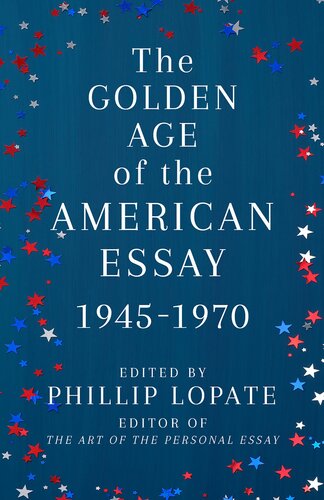
The Golden Age of the American Essay
1945-1970
- اطلاعات
- نقد و بررسی
- دیدگاه کاربران
نقد و بررسی

February 15, 2021
A celebration of writing on American culture and politics. Essayist and anthologist Lopate gathers 38 pieces from 1945 to 1970, a period when essay writing flourished and "the figure of the public intellectual, who would be expected to transmit and explain complex ideas, was in ascension." James Agee, Leslie Fiedler, Irving Howe, Elizabeth Hardwick, Rachel Carson, Martin Luther King Jr., Edward Hoagland, and Flannery O'Connor are among the writers included, with many essays relevant to our own times. For example, in "The Dilemma of Liberal Democracy" (1947), Walter Lippmann reminded readers that George Washington "believed that the people should rule. But he did not believe that because the people ruled, there would be freedom, justice, and good government." Washington realized "that there was no guarantee that the rule of the people would not in its turn be despotic, arbitrary, corrupt, unjust, and unwise." In 1964, Richard Hofstadter identified "the paranoid style" of politics, characterized by "heated exaggeration, suspiciousness, and conspiratorial fantasy" and inflamed by mass media: "The villains of the modern right are much more vivid than those of their paranoid predecessors, much better known to the public; the literature of the paranoid style is by the same token richer and more circumstantial in personal description and personal invective." Lopate notes that in the 1960s, the personal essay began to dominate with writers such as Norman Mailer (reflecting on meeting Jacqueline Kennedy), Susan Sontag (elucidating the concept of "Camp, with "its love of the unnatural: of artifice and exaggeration"), and Joan Didion. Lopate has selected both iconic essays (MLK's "Letter From Birmingham Jail") and lesser known pieces by famous writers: James Baldwin, for one, on visiting a Swiss village, where none of the 600 residents had ever seen a Black man: "there was yet no suggestion that I was human: I was simply a living wonder." Other contributors include E.B. White, John Updike, Rachel Carson, and N. Scott Momaday. Well-chosen essays on enduring themes.
COPYRIGHT(2021) Kirkus Reviews, ALL RIGHTS RESERVED.

Starred review from April 1, 2021
In selecting these 40 essays, Lopate's (To Show and To Tell: The Craft of Literary Nonfiction) goal was to convey the quality and variety of texts published over a 25-year period. The collection begins with James Agee's "The Nation: Democratic Vistas," which explains the expectations of some Americans at the end of World War II. Other topics include religion, such as Reinhold Niebuhr's "Humor and Faith," and by contrast, Richard Hofstadter's "The Paranoid Style in American Politics," which reflects on religion's responses to U.S. elections. Although published in 1964, Hofstadter's essay begins with a sentence that could have been written in the 21st century: "American politics have often been an arena for angry minds." The collection includes essays by James Baldwin ("Stranger in the Village") and Martin Luther King Jr. ("Letter from a Birmingham Jail"), but it mostly focuses on white male authors like Paul Goodman and Saul Bellow. Other essays include Norman Mailer's thoughts on Jackie Kennedy and Rachel Carson's condemnation of pesticides. VERDICT In this collection, readers might see the value of the essay format as a way to share opinions. Lopate's collection is a worthwhile slice of the history of the essay and its lasting contribution to American writing.--Joyce Sparrow, Helenwood, TN
Copyright 2021 Library Journal, LLC Used with permission.

April 1, 2021
The essay, a form of reasoned inquiry, was the perfect vessel for postwar reckoning in America. Essays were attentively read and hotly debated as writers grappled with the vulnerability of democracy, the coalescence of pro-civil rights and antiwar movements, aesthetic revolutions, and enormous social change. In the second volume of a trilogy, following The Glorious American Essay (2020), Lopate offers timelessly provocative, now freshly relevant, essays, including Walter Lippmann's 1947 warning "that there was no guarantee that the rule of the people would not in its turn be despotic, arbitrary, corrupt, unjust, and unwise." James Agee surveys persistent injustice. Albert Murray explores the culture-shaping blues idiom. Mary McCarthy's account of a train journey reveals the deep entrenchment of anti-Semitism and white supremacy. James Baldwin considers American racism while staying in a small Swiss village. Showcasing New York intellectuals, renegade New Journalists, theologians, scientists, and art critics, Lopate's gathering offers the finely forged thoughts and eloquence of Irving Howe, Norman Mailer, Martin Luther King, Jr., Flannery O'Connor, Seymour Krim, Gore Vidal, Rachel Carson, and Joan Didion. The third anthology will extend to the present.
COPYRIGHT(2021) Booklist, ALL RIGHTS RESERVED.




دیدگاه کاربران